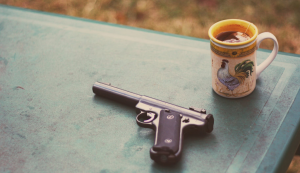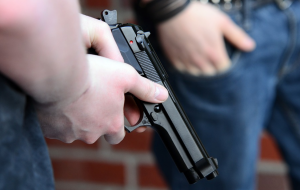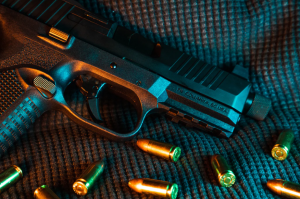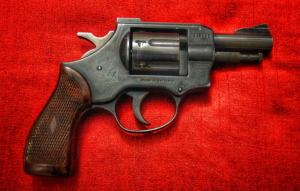Table of Contents
According to a Pew Research Center poll published in June 2017, 30% of American adults possess a gun, and another 11% live with somebody who owns a gun, totaling 41% of people living in a gun-owning home. By reading this blog you will get complete ideas about how to register a gun in your name in the USA.
The sale, ownership, and use of weapons and ammunition are all governed by gun laws in the United States. State laws vary greatly and are separate from current federal weapons regulations, but they may be wider or narrower in scope than the federal statutes. The form, substance, and amount of limitation of state legislation differ substantially. Forty-four states have a clause in their state constitutions that guarantees the right to keep and bear arms, comparable to the Second Amendment of the United States Constitution. California, Iowa, Maryland, Minnesota, New Jersey, and New York are the outliers.
Owners of firearms are subject to the firearm laws of the state in which they are located, not only the laws of their home state. In some cases, such as when it comes to concealed carry licenses, states have reciprocity. State-by-state recognition is given to them.
History of Gun Registration in the United States

New York enacted the Sullivan Law in 1911, which requires a license to acquire a firearm and is still in place today. The law allows the issuing body to choose who receives a license. The law’s goal was to restrict firearms to Irish and Italian immigrants of the time, who were deemed untrustworthy by New York officials of various lineages at the time. The legislation necessitates a distinct license for each firearm held, with the license registering the weapon’s manufacture, model, and serial number. New York City’s crime rate remained extremely high for decades following that. When the NYPD, led by then-Mayor Rudy Giuliani, intensified its enforcement of a broad variety of criminal statutes in the 1990s, the city’s violent crime rates dropped dramatically.
Anyway, anti-gun activists failed to achieve a national handgun ban or registration, but in 1993, the Democrat-led Congress passed a law aimed at achieving the first part of the Council’s three-part plan: “slowing down” handgun purchases by imposing a five-day wait time when purchasing a handgun from a firearm vendor. Prior to the law’s implementation, an NRA-backed amendment repealed the waiting time and replaced it with the National Instant Criminal Background Check System (NICS) for all guns purchased from dealers beginning in November 1998.
NICS is the FBI-run system that assesses whether a person can lawfully purchase a firearm. NICS was established as a result of the Brady Handgun Violence Prevention Act of 1993, which was titled after James Brady, Ronald Reagan Reagan’s personal assistant who was injured in an attempted assassination in 1981. It was implemented in 1998. The National Crime Information Center, the Interstate Identification Index, and the NICS Index are all used in a NICS check. Individual states contribute different types of data to the NCIC database.
Federal Firearms License
The document that permits an individual or corporation to buy, sell, or manufacture weapons in the United States is known as a Federal Firearms License (FFL). The ATF issues and monitors FFLs, and it is to them that the ATF will seek out if a query about a gun linked to a crime is raised.
Registering a Gun in your Name

There is no necessity for firearm registration on a national basis. It differs from one state to another. In certain jurisdictions, such as New York, you must not only register your gun but also get permission before buying or even owning one. Other states do not need registration and simply demand a background check at the time of purchase. Ownership of a firearm entails a tremendous deal of responsibility. When handling a firearm, you must take the necessary precautions to ensure your safety and the safety of others. It is the user’s duty to avoid accidents.
Qualifications for registering a Gun

- You should be at least 21 years old, or 18 years old if acquiring a firearm from a relative.
- You wouldn’t be qualified if you have ever been convicted of a crime.
- You wouldn’t be qualified if you have any current criminal charges or previous ones that have not been resolved in court.
- You wouldn’t be qualified if you have any court orders prohibiting you from purchasing or owning a firearm.
- You must provide a valid photo ID that includes your current address. We will not accept identification that has beyond its expiration date.
Permits required prior to the purchase

- To acquire a handgun from a private seller, you must first visit the Sheriff’s Department and get purchasing permission. You can go straight to the dealer if you’re buying from a dealer.
- You’ll need to present a valid photo ID.
- You will be needed to complete a basic questionnaire as well as a brief quiz on handgun rules and safety.
- We’ll do a background check to make sure you satisfy all of the requirements.
- You will be given purchasing permission after you have been authorized.
You must bring a copy of the death certificate with you when applying for a weapon permit if you received a handgun from the estate of a dead friend or family member. The gun can be registered in your name as long as you satisfy all of the requirements.
If you don’t have a Concealed Weapon License, you can only travel your pistol unloaded in a secured container in the trunk of your car under the following conditions:
- While traveling to or from a hunting or target practice location.
- Transportation from the store to your house, place of business, or repair location.
- When it comes to transporting things from one location of home or business to another.
If your car doesn’t really have a trunk, the firearm may be carried in the rear seat for the purposes described above, as long as it is unloaded, in a locked container, and not easily accessible to the vehicle’s passengers.
The use of weapons without proper permits and license is illegal and punishable. Not all weapons are needed to be registered, but a gun is a dangerous weapon which can kill lives. So, it is important to register the gun in your name before owning it and the registration helps in the future if there any unavoidable situation occurs to use it, and it is advisable to avoid using dangerous weapons.


1 Comment
Pingback: How to get an FFL without a business?- Live Business Blog